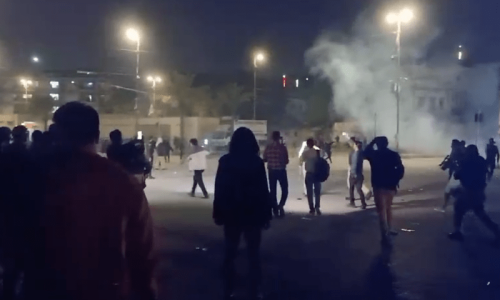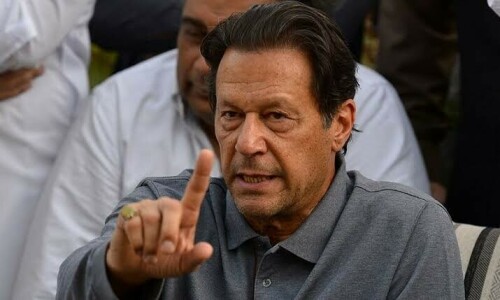
It is not for nothing that the Human Rights Commission of Pakistan (HRCP) has used the term “blinkered vision” when referring to the state's handling of Balochistan’s problem.
The problem in Balochistan is not just political or strategic – it is humanitarian. A vast majority of the people in the province – mainly in its Baloch-dominated central and southern regions – live below poverty line with next to no means of earning a livelihood. They have minimal access to education, health, roads, electricity and other means of communication. Most of them have never heard about a flush toilet, a sewerage disposal system and running tap water. Their ramshackle abodes are as basic as the temporary shelters in a badly run refugee camp and their belongings as nominal as those of any asset-less group of people in a war-ravaged African country. If this is not a humanitarian crisis, what is?
Those who see the trouble in Balochistan from the prism of politics – separatist groups, Balochistan-based politicians and political parties and the intellectuals mainly based in Quetta – refer to the humanitarian aspect of the problem only as much as it advances their arguments for greater political and economy autonomy or freedom. Same is the case with those for whom the trouble in the province is inexorably linked to Pakistan’s territorial integrity, national defence and the country’s place in the regional chessboard – read, the federal establishment, the armed forces and agencies as well as the intelligentsia based in Pakistan’s strategic, political and economic never centers. They cite the humanitarian issues in Balochistan in so far as these help them to discredit the separatists/insurgents and discount the social set up in Baloch areas of the province that revolves around tribes and their chieftains.
The sad part is that taking a tunnel view is not the exclusive domain of just one side to the problem. Both the sides, in fact, suffer from it when it comes to recognising, understanding and resolving the numerous and multifarious issues in the province in humanitarian terms.
Here is the nub of the flaw in the approach of the two sides: They treat the humanitarian angle of the trouble in Balochistan as an effect – either of the lack of political and economic freedom which hinders the Baloch people from taking ownership of their own development or of continued conflict that hampers the government and the state from investing in social sectors.
Consequently, the two camps are focusing their arguments in a zero-sum relationship between the resolution of the humanitarian problems and political and economic autonomy/freedom on the one hand and investment in a social infrastructure and control over the Baloch lands on the other. While the former demands autonomy ahead of development, the latter underpins the setting up of schools and hospitals and construction of roads with an end to insurgency, violence and conflict.
Any meaningful search for an effective solution should actually start from treating the humanitarian issues as the cause of the problems in Balochistan. The Baloch people remain beholden to their chiefs and indifferent towards the existence and the imperatives of the state because they do not know if trying to change these conditions would entail any change in the physical and social circumstances of their lives.
The reason that they are suffering under their hidebound tribal traditions as well as due to the excesses of an oppressive security state are not that they are not autonomous in conducting their political and economic affairs or some of their chieftains are too stubbornly troublesome for the general good of the Baloch society. They live as they do because they have never known, let alone experienced, anything other than their poverty, illiteracy and poor health. These appear to be the only conditions of life they have known since ages. They do not know if they have other options and nobody seems willing or bothered to let them know about those options. Without any meaningful and productive encounters with a school, a hospital and a road, they end up getting the worst of both the worlds – a tribal system that keeps them under the yoke of their chiefs and a state unwilling to change anything for the better for the Baloch people before it gets a firmer grip on their territory.
If the state wants to resolve the problem in Balochistan, it needs to do things differently from what it is doing now. Firstly, it must ensure that its security and intelligence personnel are not the first ones to get in touch with the young and the old in the Baloch society. secondly, it needs to raise the living standards of the Baloch by providing them education, healthcare, roads, electricity and clean drinking water – not as a political bribe to force them to take an oath of allegiance to Islamabad but as a genuine, sincere effort for their socio-humanitarian uplift so that they realise that there is a different life awaiting them if they refuse their chieftain’s control over their lives. Thirdly, it needs to continue devolving political and economic power to the Baloch people with an uninterrupted regularity including the holding of free and fair elections at the national, provincial and local levels. Lastly and most importantly, it should stop treating Balochistan only as a territory with strategic significance with no mentions to millions of people living in it and the precious mineral and hydrocarbon resources under their feet.
The champions of political and economic freedom should also understand that autonomy under the existing social indicators in the province will be meaningless for most Baloch people. Tribal chieftains and a small contingent of middle-class government officials and intellectuals will continue dominating the Baloch society in the foreseeable future as the tribe-based politics, security forces and the settlers do now.
If they are looking for a feasible change, they first need to heavily focus on the social transformation of the Baloch society. To achieve that, they should complement their struggle for political and economic rights with a large scale civic activism to educate the Baloch, raising the level of their socio-political consciousness and educating them about the need for acquiring the modern amenities of life. Only when such a socio-political consciousness exists can the Baloch political leaders and intelligentsia expect a mass following for the causes of freedom. Otherwise, their efforts towards these goals will be of the few and by the few which, even if they succeed, will achieve political and economic autonomy – even freedom – that will be only for the few and by the few. It is, therefore, in the field of humanitarian development of the Baloch people that the battle for their hearts and minds should be waged – and lost and won.
Badar Alam is editor of the political monthly magazine, Herald.












































